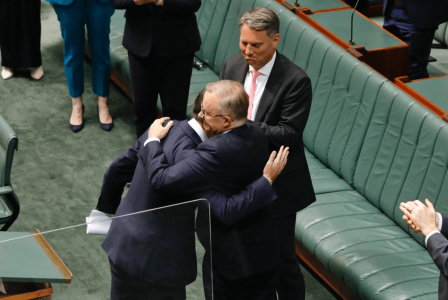2022-3 Federal Budget: What does it mean for you?
- Replies 54
2022-3 Federal Budget: What does it mean for you?
Yesterday, we looked at the available budget information and what we could expect in terms of support for pensioners. There are a few surprises here and there so stay tuned for everything you need to know.
Well, the Albanese government's first federal budget has officially been released and the question on everyone’s lips is: what does it mean for pensioners? And on a personal level, what does it mean for you?
Cost of living
Unfortunately, members, this isn’t great news.
‘This budget makes hard decisions for hard times,’ Chalmers said in his budget speech.
Further global economic downturn is expected as the government responds to inflation and deals with disaster payments in the wake of the floods. All in all, the economic outlook of Australia looks gloomy.
Despite this, Treasurer Jim Chalmers said, ‘Our economy is expected to grow solidly this financial year, by three and a quarter per cent, before slowing to one and a half per cent growth for 2023-24, a full percentage point lower than what was forecast in March.’
‘The worst thing that we could do is contribute to even higher inflation,’ Chalmers said. ‘We don’t want cost-of-living relief to be counter-productive. The best thing we can do now is exercise restraint.’
$65.7 million in funding has been set aside for government agencies including the Australian Competition and Consumer Commission (ACCC) to regulate the gas and electricity industries. Currently, it’s expected that prices will increase by up to 58 per cent in the coming year (20 per cent increase by Christmas and approximately 30 per cent in the coming financial year).
‘I'm not going to pretend that we're not worried about these electricity price forecasts,’ Chalmers told reporters.
‘I think any responsible government, facing these kinds of price hikes for electricity and gas, needs to consider a broader suite of regulatory interventions,’ he said, making it clear his preference is for legislation, rather than cash splash spending programs.
Working Pensioners and Self-Funded Retirees
Those of you on the age and service pensions can finally earn additional wages before seeing your payments cut.
Working pensioners can now earn an extra $4000 as a one-off this financial year before their payments are reduced. This is a rise in allowed earnings from the previous $7800 to $11,800.
This kicks in from 1 December 2022 and eligible pensioners will have their Work Bonus Income Bank credited until 30 June 2023.
Subject to passage of legislation, Age Pension and equivalent Department of Veterans’ Affairs pension recipients with employment income who exceed the income limit will have their payment suspended for up to two years, rather than cancelled after 12 weeks as is currently the case.
They will also be able to keep their Pensioner Concession Card, and associated benefits, for up to two years.
Almost $70 million has been allocated to increase the income threshold for the seniors’ health card from $61,284 to $90,000 for singles and from $98,054 to $144,000 (combined) for couples.
This higher income threshold is expected to also give more than 50,000 self-funded retirees access to the Commonwealth Seniors Health Card (CSHC).
Housing affordability
As predicted, the National Housing Accord plans for one million affordable houses. This will kick in from 2024 so don’t expect anything anytime soon.
But while building 1 million homes in five years sounds unrealistic, the ABC reports that 985,085 houses were built in the five years prior to March 2022.
‘The budget also includes $350 million for the federal government and states and territories to build 10,000 new homes each year.’ states the ABC.
Older Australians will also continue to be encouraged to downsize their homes and $74 million has been pledged to support this.
The budget will expand the exemption of home sale proceeds from pension asset testing from 12 months to 24 months. This will give pensioners more time to purchase, build or renovate a new home before their pension is affected.
The lower deeming rate (0.25 per cent) will still apply. This rate lower deeming rate will also remain frozen at 0.25 per cent. The upper rate will remain at 2.25 per cent for the next two years (until 30 June 2024).

Prime Minister Anthony Albanese congratulates Jim Chalmers on his first budget. Image Credit: ABC News: Nick Haggarty
Health careFrom January 1, 2023 the maximum general co-payment for Pharmaceutical Benefits Scheme (PBS) medication lowered to $30 per script (from $42.50). The government expects this will save around 3.6 million Australians more than $190 million in out-of-pocket costs.
The bad news? Concession card holders already pay a lower $6.80 co-payment and this figure is not set to change anytime soon. So is this PBS reform even helping the right people? You can read more here.
Funding does, however, include Flash Glucose Monitoring and Continuous Glucose Monitoring devices which is good news for Australians living with Type 1 Diabetes. $327.7 million has been confirmed over 4 years from 2022–2023 so we can expect this to come into effect ASAP. More information is due to be released soon.
$114 million will go to additional mental health and suicide prevention initiatives, including $47.7m to restore the loading for Medicare subsidised online psychiatry consultations and a $23.5m expansion of the headspace network.
Cancer patients and their families, medical professionals, and researchers will benefit from $452 million to deliver new Comprehensive Cancer Centres in Adelaide and Brisbane. Meanwhile, $14.8 million in funding will establish a Melanoma Nurses Program across Australia.
Finally, preparatory work to establish an Australian Centre for Disease Control will begin with $3.2 million in funding.
Aged Care
The budget shows a commitment to improve safety, dignity, quality and humanity in the aged care sector.
‘This Budget builds on the recommendations of the aged care royal commission and implements the government’s federal election commitments to further reform aged care,’ says Ian Yates, Council on the Ageing CEO.
A $3.9 billion investment in this budget will implement reforms that meet the needs of aged care recipients.
How will the $3.9 billion package be spent?
- $2.5 billion towards 24/7 nurses and increased care minutes
- $48.6 million towards establishing Aged Care Complaints Commissioner and the Inspector-General of Aged Care
- $312.6 million towards improved information and communication technology
From 1 July 2023, aged care residents will benefit from the new requirement for aged care homes to have a registered nurse on site at all times. That’s right, at least one registered nurse must be on site 24 hours a day, seven days a week.
For Australians who wish to be independent and remain living in their own home, reforms to in-home aged care will start from 1 July 2024. Existing in-home aged care programs will continue until this time. You can read more about the existing in-home care packages here.
There is also greater support for young Australians interested in studying aged care such as free TAFE courses. In time, this should increase the available staff in a struggling industry.
Bottom line
While the current budget will decrease overall debt in the next few years and basically halve the deficit, overall Australia’s borrowings are expected to surpass $1 trillion by June 2024. Ultimately, the pension rate and CPI increases are not keeping pace with inflation.
As member @Qwarkus aptly summarised, 'The supermarket trolley holds less every week.'
Anything else of interest?
I’m glad you asked! Other main winners from the budget include the $4.7 billion confirmed spending on childcare, $530 million for paid parental leave and $852 million for vocational education.
Did you tune into the budget, members? Did the government meet your expectations? This is Labor’s first federal budget since 2013 so we’d love to hear from you directly. Let us know in the comments below!
Last edited:








